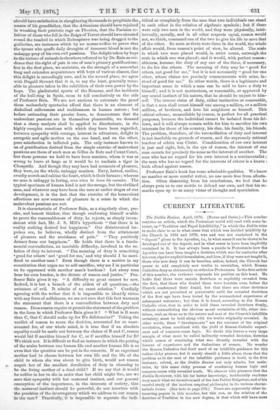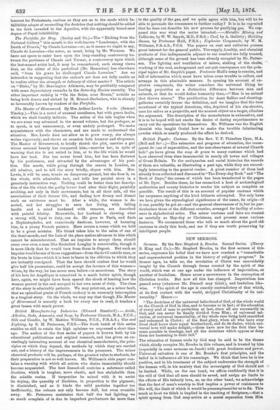CURRENT LITERATURE.
The Dublin Review. April, 1876. (Burns and Oates.)—This number contains an article, which the Protestant world will read with some in- terest, on" Tradition and Papal Infallibility," in which the Dublin tries to make clear to us in what sense that which was decided infallibly by the Church in 1851 and 1870, was and was not contained in the " deposit " given to the Apostles, i.e., in -what sense it can be shown to be developed out of the deposit, and in what sense to have been implicitly contained in it. It has always been a puzzle to Protestants how the Apostles can have been taught a doctrine which was for centuries after not even ripe for explicit formulation, and how, if they were not taught it, those who -now deny it can be heretics, unless, indeed, the Church has power to add completely new truths to revelation, which Roman Catholics deny as strenuously as orthodox Protestants. Lithe first article of this number, the reviewer expounds his position on this head. He holds that there were certain doctrines so explicitly revealed from the first, that those who denied them were heretics even before the Church condemned their denial, but that there are other doctrines which are not perceived or perceivable until the revealed doctrines of the first age have been tested by the accumulated experience of subsequent centuries; but then it is found, according to the Roman Catholic view, that in order to hold these revealed doctrines firmly, without contradicting the obvious moral certainties of life, other doc- trines, such as those as to the nature and seat of the Church's infallible certainty, must be held along with the truths originally revealed. In other words, these "developments" are the outcome of the original revelation, when combined with the yield of Roman-Catholic experi- ence and of common-sense logic. No doubt this leaves a very large margin of what must be called indirectly revealed doctrine, doctrine which comes of combining what was directly revealed with the lessons of experience and the deductions of reason. No wonder the Roman Catholics feel their need of an infallible guidance for this rather risky process, but it surely should a little alarm them that the problem as to the seat of the infallible guidance is itself, in the first instance, solved, as the Dublin Review not only admits, but main- tains, by this same risky process of combining human logic and common-sense with revealed truth. We observe with pleasure that the Dublin Reviewer, with his far better knowledge, incidentally confirms very much what we ourselves said of the late Father Dalgairns, and of his careful study of the modern sceptical philosophy in its various charac- teristic fcrms. (See note to page 279.) There are apparently other in- teresting papers in this number, but this one, on the relation of the doctrine of Tradition to the new dogma, is that which will have most
interest for Protestants, curious as they are as to the mode which In- fallibility adopts of reconciling the doctrine that nothing should be added to the faith revealed to the Apostles, with the apparently brand-new dogma of Papal infallibility.



































 Previous page
Previous page